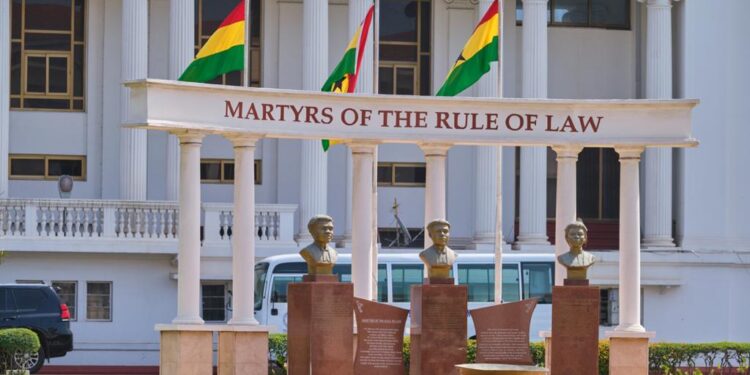Fell in love with one’s husband, funded a building on their land: SC gives lady 50% share
"Plaintiff’s share in H/No. AV. 31/3 Ankaful Cape Coast is put at 50%. This is because this court considered her contributions as substantial coupled with the customized completion she did on the first floor where she lives."

When on the strength of exhibit G, it was found that the appellant, an African American had borne a substantial part of the expenses to the couple’s building, the apex court then considered the extent of the area occupied by her in the building.
It thus made a finding that the respondents wouldn’t have allowed her to occupy virtually the entire first floor of the building if her contribution was insignificant.
The appellant, Sylvia Gregory, an African American who resided at Ankaful to be precise, visited Ghana somewhere in 1988 and met the first respondent, Nana Kwesi Tandoh IV, a traditional ruler in Elmina.
They later became very good friends leading to the traditional ruler, introducing Sylvia to his wife, Bridget.
This friendship grew in leaps and bounds with Sylvia accepting an invitation to lodge and reside with them anytime she visited Ghana thereafter at a time that the respondents were living in a rented premise.
Over time Sylvia and the first respondent fell in love.
According to the facts on record, Nana Tandoh IV then proposed to marry the plaintiff at the Cape Coast Municipal Assembly.
Even though this marriage ceremony never took place, the relationship between the parties grew stronger with his wife not showing any signs of rivalry or jealousy.
Sylvia was then convinced by Nana and his wife to provide funds for the construction of a house on a vacant plot of land belonging to them.
When the house was barely completed, the plaintiff moved into occupation later followed by respondents with the plaintiff virtually occupying the first floor of the house and the latter the ground floor.
Even though they disputed substantial contributions of Sylvia towards the construction of the house, they did not take steps to prevent her from either occupying the house altogether or the almost 50% sharing of the occupancy.
She later brought her daughter from the United States of America to reside with the respondents in Ghana and provided a bus that was run commercially by the first respondent.
Matters soon got out of hand and it became increasingly clear that Sylvia's family and the respondents' family could not cohabit together in peace on the same premises.
Sylvia thus issued a writ at the High Court owing to a series of skirmishes, quarrels, and criminal acts which ensued between them.
High Court
The High Court delivered a judgment in part in which it vested the house in the respondents and ordered the possession of the premises occupied by the plaintiff and thereby injuncting her.
It thus ordered the plaintiff to vacate the premises and ordered the respondents to return her assistance or contribution to the building.
Court of Appeal
The plaintiff followed to the Court of Appeal where their lordships maintained that she did not make a substantial contribution to the building and thus upheld the Judgement of the High Court and dismissed the appeal.
Supreme Court
With 18 grounds of appeal, Sylvia continued to the apex court averring among others that the finding that her contribution was not substantial was not supported by the evidence on record.
In its judgment, the apex court made an observation that “the findings of fact made by the learned trial Judge and concurred in by the first appellate court were not supported by the evidence on record and perverse having regard to the circumstances of the case.”
The court also found that the plaintiff under the assumption of marriage to Nana Tandoh IV made various contributions including payment of bills and more which she did not obtain or demand receipts.
Therefore their Lordships in the opinion of Dotse(JSC) with a concurring opinion by Gbadegbe(JSC) thus deemed the plaintiff’s contribution in equity as contributions towards the house.
In the end, the plaintiff’s appeal was upheld in part as follows;
Plaintiff’s share in H/No. AV. 31/3 Ankaful Cape Coast is put at 50%.
The defendants are entitled to a 50% share or interest in this house AV 31/3 Ankaful.
It is ordered that the house, the subject matter of this appeal shall be valued by the Land Valuation Board and the parties herein shall bear the cost of the valuation equally. The defendants herein who are also entitled to 50% interest in the said property are given the first option to buy the interest of the plaintiff
It is further ordered that until these are completed and the plaintiff paid off to enable her to relocate, the defendants and their agents are restrained from interfering with the quiet, peaceful enjoyment and occupation of the plaintiff in her portion of this H/No. AV31/3, Ankaful.
The first defendant to take steps to convey to the plaintiff the plots of land the plaintiff paid him to purchase for her to wit land at Ankaful and Elimina, within six (6) months of the date of judgment.
Read the full judgment here.


